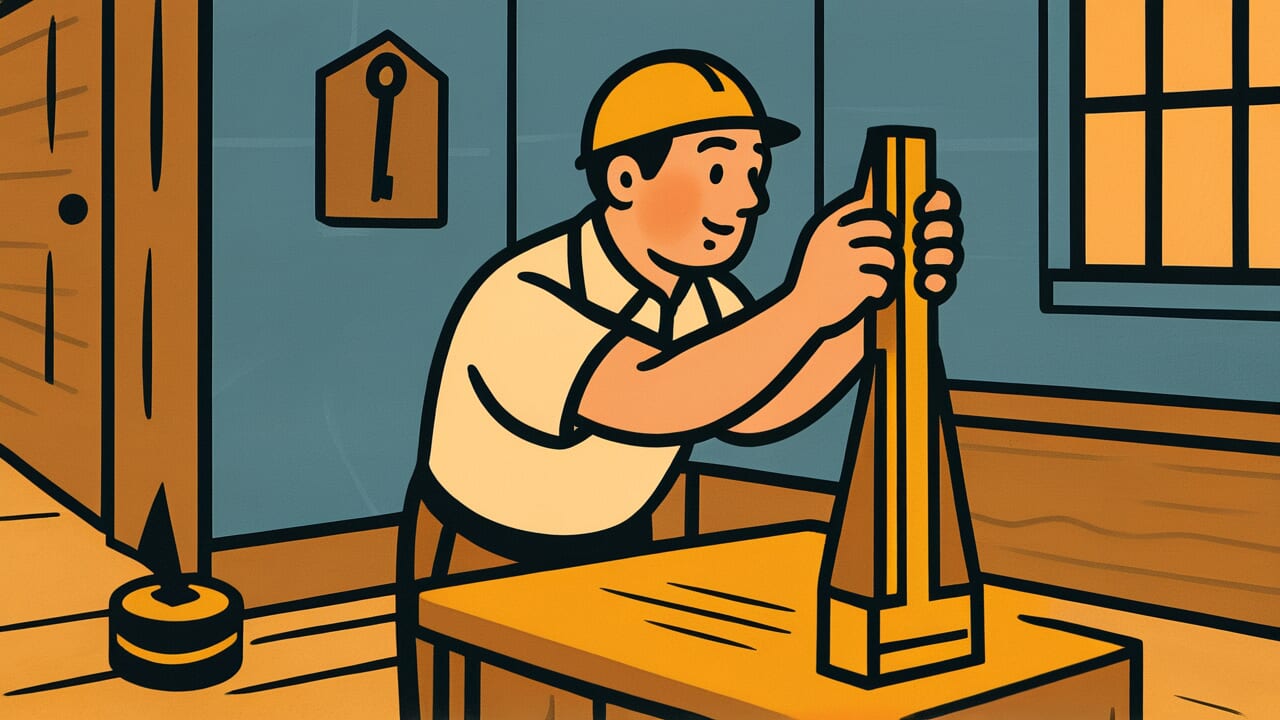How to Read “A great craftsman does not change his measuring line for a poor worker”
たいしょうはせっこうのためにじょうぼくをかいはいせず
Meaning of “A great craftsman does not change his measuring line for a poor worker”
This proverb means that excellent leaders do not lower their standards to match inexperienced people. If you bend the proper standards just because someone lacks skill or knowledge, that person cannot truly grow.
Even if it seems harsh, continuing to show the correct standards is the path to drawing out someone’s full potential.
This expression is used in teaching and guidance situations. It’s used when you want to convey the importance of maintaining high standards without easy compromise.
In modern times, there’s a tendency to demand quick results. But this proverb teaches us that genuine growth takes time. Leaders should hold firm to their standards with conviction.
Not lowering standards shows you believe in the other person. That is true kindness and true strictness.
Origin and Etymology
This proverb is believed to come from the ancient Chinese text “Mencius.” The “measuring line” refers to a tool carpenters use to draw straight lines on wood.
It’s a basic tool used since ancient times. You stretch a string soaked in ink, then snap it to mark a line on the wood.
“Great craftsman” means an excellent master builder or skilled artisan. “Poor worker” means an inexperienced craftsman.
In Mencius’s time, building techniques were strictly passed from master to apprentice. The standard tools and methods were considered absolute.
If you bent the standards just because an inexperienced apprentice couldn’t use the measuring line well, proper technique wouldn’t be transmitted. Instead, the apprentice had to work hard to reach the standard. That’s how skills were passed down.
Mencius used this carpenter’s example to explain the importance of principles in education and politics. Excellent leaders must not easily change the standards and principles they should uphold just because someone is inexperienced.
It may seem harsh, but it’s actually an attitude that believes in the other person’s growth and draws out their true ability. This teaching came to Japan and became established as a proverb.
Usage Examples
- Lowering evaluation standards just because newcomers are struggling goes against the spirit of “A great craftsman does not change his measuring line for a poor worker”
- He’s a strict instructor, but because he holds the belief that “A great craftsman does not change his measuring line for a poor worker,” he has raised many excellent people
Universal Wisdom
The universal truth this proverb speaks is that human growth requires “clear standards to reach.” When we see someone struggling before us, we naturally want to lower the standards to make things easier.
That feeling comes from kindness. But real growth can only be gained by continuing to challenge high standards.
Humans have a mysterious power. When there’s a clear goal, we can demonstrate abilities that surprise even ourselves.
On the other hand, when standards are vague or quickly lowered, people become satisfied without bringing out their full potential. This is human nature that doesn’t change with the times.
This proverb has been passed down for so long because it perfectly captures the struggle of those who guide others. Maintaining standards can sometimes seem cold.
But that strictness comes from believing in the other person’s potential. When someone expects something of us, we try to meet those expectations.
Our ancestors deeply understood this human essence. What is true kindness? It’s not giving immediate comfort, but protecting an environment where that person can truly grow.
That’s what this proverb teaches us.
When AI Hears This
This proverb points to a fatal trap in system design. When you change standards to match one inexperienced worker, it affects everyone who uses those standards.
In system theory, this is called “local optimization causing overall degradation.” For example, if a company simplifies its work manual for one new employee, that simplified version becomes the standard. The efficiency of experienced workers drops too.
The bigger problem is that low standards persist even after that new employee grows. This is a phenomenon called “downward rigidity of standards.” Once you lower standards, they’re hard to raise again.
What’s interesting is the effect of “selection pressure” created by not changing standards. Just like biological evolution, high standards make adaptation forces work.
If you keep changing standards to match individuals, the entire system’s ability improvement stops. This is confirmed in educational settings too.
Data shows that classes maintaining high standards ultimately have higher achievement levels for everyone compared to classes that lowered standards.
In other words, this proverb highlights the paradox that “short-term kindness becomes long-term cruelty.” Consideration for individuals and system health sometimes have a trade-off relationship.
Excellent designers need to discern this balance.
Lessons for Today
What this proverb teaches modern people is what true kindness really means. When you’re in a position to guide someone, there will be moments when you want to lower standards seeing them struggle.
But hold firm in those moments. Maintaining standards means believing in that person’s future.
Modern society demands quick results. Efficiency, optimization, and compromise. But there are no shortcuts to human growth.
By challenging high standards, sometimes failing, and continuing without giving up, people gain real strength.
If you’re on the learning side, be grateful for instructors who show you strict standards. It’s proof they believe in your potential.
And when you can’t reach those standards, you don’t need to blame yourself. What matters is not looking away from the standards and moving closer step by step.
Standards aren’t there to make you suffer. They’re guideposts showing you where you should aim.



Comments